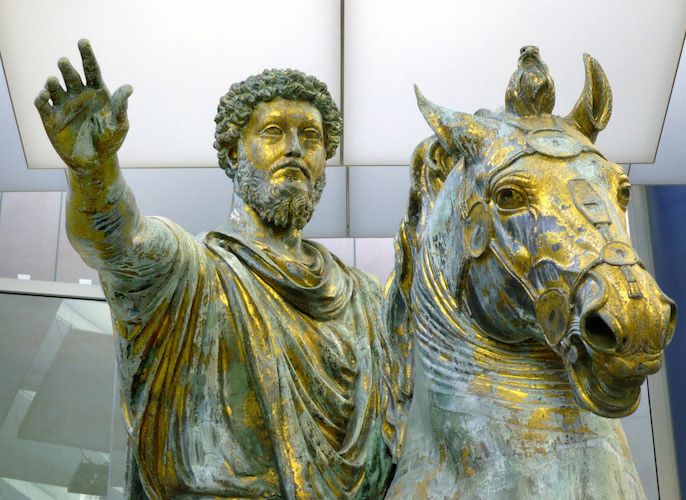As emperor of Rome, Marcus Aurelius was best known for his enlightened mind.
Taught by the finest teachers of his time, he was considered one of the most powerful men in the world.
“Meditations” is a series of personal writings which were later split into 12 books. These writings were never meant to be published. They are more of a “journal” which embodies the mind and habits of Marcus Aurelius.
Reading “Meditations” expanded my mind. At first I was startled by the abundance of spiritual practices that Marcus Aurelius adapted. To have such a broadened mind in 160 CE, offers us a glimpse of the brilliance and importance of the thinkers of ancient Greece and how they still influence our lives today.
After close to 2,000 years, his words are still applicable. Below are some profound spiritual lessons we can find in the writings of Marcus Aurelius:
Be good.
“The best revenge is not to be like your enemy.”
“If any man despises me, it is his problem. My only concern is not doing or saying anything deserving of contempt.”
“No matter what anyone says or does, my task is to be good.”
The power of the mind.
“The happiness of your life depends upon the quality of your thoughts.”
“You have power over your mind; not outside events. Realize this, and you will find strength.”
“Our life is what our thoughts make it.”
“The directing mind is that which wakes itself, adapts itself, makes itself of whatever nature it wishes, and makes all that happens to appear in the way it wants.”
Never fear the future.
“Rather than saying ‘It is my bad luck that this has happened to me,’ you should say, ‘It is my good luck that, although this has happened to me, I can bear it without pain, neither crushed by the present nor fearful of the future.’”
“Never let the future disturb you. You will meet it, if you have to, with the same weapons of reason which today arm you against the present.”
~
You are your own master.
“Either pain affects the body (which is the body’s problem) or it affects the soul. But the soul can choose not to be affected, preserving its own serenity, its own tranquility. All our decisions, urges, desires and aversions lie within.”
“Choose not to be harmed, and you won’t feel harmed. Don’t feel harmed, and you haven’t been.”
“Today I escaped from anxiety. Or no, I discarded it, because it was within me, in my own perceptions; not outside.”
The “now” is all you have.
“Confine yourself to the present.”
“Forget everything else. Keep hold of this alone and remember it: Each one of us lives only now, this brief instant. The rest has been lived already, or is impossible to see.”
Change is inevitable.
“Loss is nothing else but change, and change is Nature’s delight.”
“Keep in mind how fast things pass by and are gone—those that are now, and those to come. Existence flows past us like a river: The ‘what’ is in constant flux, the ‘why’ has a thousand variations. Nothing is stable, not even what’s right here.”
“Frightened of change? But what can exist without it? What’s closer to nature’s heart? Can you take a hot bath and leave the firewood as it was? Eat food without transforming it? Can any vital process take place without something being changed?”
Don’t label events.
“You take things you don’t control and define them as ‘good’ or ‘bad.’ And so of course when the ‘bad’ things happen, or the ‘good’ ones don’t, you blame the gods and feel hatred for the people responsible, or those you decide to make responsible.”
“You can strip away many unnecessary troubles which lie wholly in your own judgment.”
“That all is as thinking makes it so, and you control your thinking. So remove your judgments whenever you wish and then there is calm.”
Relephant:
What Philosophy Has Taught Me about Life.
~
Author: Elyane Youssef
Editor: Travis May
Photo: Wikimedia












Read 3 comments and reply